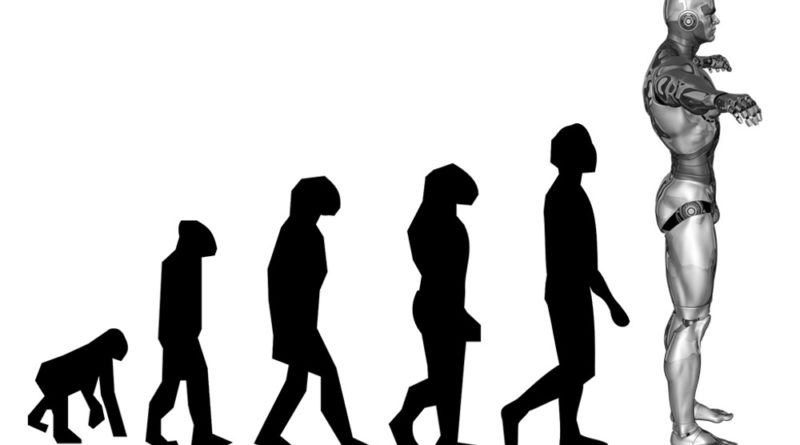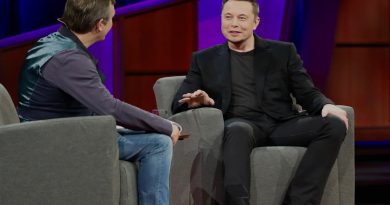Manmade Evolution Is Underway
Evolution – according to the Dictionary – is “the process by which different kinds of living organisms are thought to have developed and diversified from earlier forms during the history of the earth.” Other sources mention also natural selection and adaptation.
Now, we are approaching a new stage in our development as species. For the first time in history, we are about to partake in a manmade evolution. We are about to become enhanced courtesy of new technologies such as Brain-Computer Interface (BCI), artificial intelligence (AI), machine learning and VR (virtual reality) and yes, genomics. The potential of these new technologies and their prospective applications is nothing short of amazing.
Elon Musk’s Neuralink focused on the Brain-Computer Interface (in the form of an implantable, wireless microchip disc) believes: “This technology has the potential to treat a wide range of neurological disorders, to restore sensory and movement function, and eventually to expand how we interact with each other, with the world, and with ourselves.”
While the implantable Brain-Computer Interface devices are still being refined, other scientists, researchers and companies are forging forward with BCI and VR wearable devices such as headsets and glasses.
The prospect of an upcoming upgrade of our naturally limited cognitive abilities is exciting and promising. It opens never before considered directions in human development.
Sturm Enrich, the founder of Alternative Human Community, had several eye-opening conversations with Dr. Avinash Singh, transhumanist and cybernetics researcher at the Australian Artificial Intelligence Institute, University of Technology Sydney. Since each of them addresses a different aspect of AI, Brain-Computer Interface and neurotechnology, Alternative Human Community is thrilled to feature a series of interviews with Dr. Avinash Singh that enrich (and turn upside down!) our understanding of things to come.
Sturm Enrich: The way I understand it, Brain-Computer Interface (BCI) will not only significantly increase human cognition, but necessitate a major shift in the focus of education and could – by way of facilitating nearly instantaneous access to information – significantly increase the average intelligence level.
As much as now we’re learning facts, the goal of future learning (for the majority of people) would become technology, organizing – and processing – of data. Am I correct?
Dr. Avinash Singh: Yes, you are right. Currently, we are entering the education system at the age of 4 or 5 and continue learning until the age of 20 or 21, on average. Those pursuing higher degrees often study till they are 30. However, as BCI technologies advance, I can imagine that at some point in the future, we’ll be able to download the knowledge we want directly into our brain. When I said “download”, I meant that due to the involvement of biological processes such as creating and updating more synapses’ connections, brain rewiring, etc. some processing time will be required. So, after downloading the knowledge, it may take a few hours or days or months to allow the brain to rearrange itself to be able to absorb the newly downloaded knowledge. So again, the answer is yes, BCI will definitely change, improve and accelerate our learning process. It will also significantly shorten the duration of formal education.
As you said, the overall learning process will become more about processing and organizing data to speed up downloading and assimilation of knowledge. It will be very similar to the process of how we compress computer files so that they can be easily uploaded and downloaded over the Internet. We also need to devise some techniques and processes that allow us to uncompress knowledge and write it to the brain as fast as possible. Obviously, the technology would have to consider the target age of users, i.e. whether a child should be allowed access or not, or restrict access for users under the age X or over the age X. (Of course, I favor an age when the brain is scientifically known to be fully grown so that its full potential can be used.)
Sturm Enrich: In theory – and with help of the many modern technologies: Brain-Computer Interface (BCI), artificial intelligence (AI), machine learning and VR (virtual reality) – isn’t it conceivable that anyone could perform tasks of, for example, a physician, pilot or engineer?
Dr. Avinash Singh: This is a very interesting question, and yes, given access to so much information and so many technologies, it feels like everyone could do just about anything. (This reminds me, I marvel at today kids’ knowledge of digital devices. I learned computer science during high school and earned my degree in computer science. But now, these youngsters who didn’t even complete junior high know more and are more at ease with computer science than most adults!)
To answer your question: no, professional tasks would not be implementable by unqualified individuals until or unless – in addition to feeding the brain with information – we are also able to reprogram the body. If we’re talking about downloading a specific skill set, let say surgeon’s skills, without reprograming the user’s body, such a body wouldn’t be able to perform the job of a surgeon due to the lack of physical training for operating surgical instruments or muscle memory. In such a case, even though we know what to do because we got all the necessary knowledge sitting in our brain, we couldn’t perform a surgery.
Of course, it would be different if a profession involved the brain only, such as a historian or physicist. I can imagine that knowledge alone would enable a person to carry out the duties of a historian or physicist, successfully.
With that said, in the future, as bioprinting and mind-uploading / downloading advance, becoming a professional in any area of expertise fast is conceivable…..
Sturm Enrich: Will Brain-Computer Interface (BCI) enable instantaneous translation so we could communicate in a foreign language without actually knowing it? Or would it circumvent language entirely by allowing two brains to communicate directly without language being involved at all?
Dr. Avinash Singh: Well, communication is fundamental to almost every living being. A BCI or Neurotech will definitely facilitate it. For that, we don’t need to look very far ahead.
There were already a few attempts made this year with researchers enabling users to communicate in machine-generated words directly from a brain implant (aka Speech BCI or a BCI for decoding speech from Brain). Well, once your BCI can extract such information from the brain, it is a matter of passing words / sentences to a translator (e.g. Google), taking its output and synthesizing it. The result would be SpeechBCI, a technology with which you could communicate in virtually any language just by thinking of the content of your communication and selecting the language of your choice. However, the future is even more interesting.
BCI will eventually enable communication without actually inputting specific words or language. This type of communication is called Brain-2-Brain communication or B2B Interface. In B2B, we may think in a language, and those thoughts will be extracted by neurotech and simply sent over or broadcast to other listeners out there, and their neurotech would write them to their brain or stimulate their speech / auditory cortex. (It would eliminate the need for translation entirely!) Such a tech reminds me of the Nexus Trilogy from Ramez Naam, where a nano-drug allows the brain to program, network, communicate and even feel other nano-drug-enabled brains around the user.
Sturm Enrich: Mark Twain said: “Truth is stranger than fiction, but it is because Fiction is obliged to stick to possibilities; Truth isn’t.” In the context of our conversation, he was right.
Will it become possible to “edit” someone’s character? What would become of individuality?
Dr. Avinash Singh: Editing someone’s character and personality is a very interesting question. Indeed, I haven’t thought about it much. There’s always the possibility that we could change someone’s personality using BCI and this question is not new.
For example, patients suffering from severe Parkinson’s disease are usually told to get an implant that significantly reduces tremors and enhances quality of life.
Imagine a person who has been suffering from tremors for a long time; a person who gets easily irritated, is grumpy, and can’t focus on anything. Following the implant procedure, the very same person suddenly becomes very calm, pleasant and enjoys his hobbies. What would you call it, a personality change or not? I would say yes, it is a change in personality and the cause is a neurotech implanted in his brain.
This is not just a case of neurotech, but several other technologies that can have a significant impact on a person’s personality and / or its change. This applies also to BCI in general.
But the big question is, can someone’s personality be edited. My answer is, yes. In the future, BCI will definitely allow us to edit someone’s personality. Initially, the technology might be used to treat certain mental disorders such as depression, but later it could be used to improve someone’s lifestyle or even to prevent a criminal from committing other crimes.
However, there must be a law that would legitimize performing such changes and a professional or automated supervision of such a law’s implementation. Of course, whether voluntary or involuntary, a personality change raises several moral questions. One of them: will you still be the same individual afterward? To answer that, my argument is: don’t we accept a friend who’s views on a given subject have completely changed? Let’s say someone changes their gender or becomes a vegetarian. Don’t they have the same personality as before?
Are we as a society ready to accept such a sudden and radical change in someone we know? It is human nature to resist change, and change in personality is a big one. Would the prospect of personality editing or someone’s sudden personality change, be embraced?
Sturm Enrich: You are right, these are intriguing questions.
Yet another aspect of “personality editing” who would have the right to order a “custom edit”. In California, the Right To Die raised many questions. The main concern was whether the family who stands to inherit from a terminally ill patient could use the law to collect its inheritance, sooner.
Thank you, Dr. Singh, for sharing your expertise and thoughts with us.
*
A lot to digest, isn’t it?
This is the dawn of a new era and the first step toward becoming a transhuman (or a cyborg, if you prefer): a human being capable of transcending his or her brain’s natural limitations.
Quite a revolutionary idea, technologies that would enable the average Joe to become a “genius”. Well, the new technologies move us in this direction. Are you ready?
“It is not the strongest of the species that survives, nor the most intelligent that survives. It is the one that is the most adaptable to change.” Charles Darwin
The manmade evolution is underway. Could a manmade creation be far behind? (A hint: no!)
About Dr. Avinash Singh:

Dr. Avinash Singh is an Australian Research Council Postdoctoral Research Fellow at the Australian Artificial Intelligence Institute in University of Technology Sydney (UTS), Australia, and Founder of India Future Society. He is also a member/advisor of think-tanks such as IEEE, Transhumanism Australia, International Longevity Alliance, Lifeboat Foundation, and recently Transhuman Coin. He also serves the IEEE Standards committee on Neuroethics and Brain-Computer Interface (BCI), and recently received Google TensorFlow Faculty Award to support and promote his work in BCI.
His current research interests are integrating artificial intelligence (Al) technologies with cognitive neuroscience knowledge to explore cognitive functions, discover the relationships between brain dynamics, evaluate everyday interaction, make decisions, and develop robust next-generation brain-computer interfaces for the masses.
LinkedIn: https://www.linkedin.com/in/avinashks/
UTS: https://profiles.uts.edu.au/Avinash.Singh
*
Exclusive interviews with Dr. Avinash Singh, transhumanist and cybernetics researcher:
Advanced Technology Can Lead To Either Utopia Or Dystopia
Neurotechnology To Grant Us Superpowers
*
The image on top of this post is a collage. Image credits are due to: Clker-Free-Vector-Images from Pixabay and DrSJS from Pixabay




